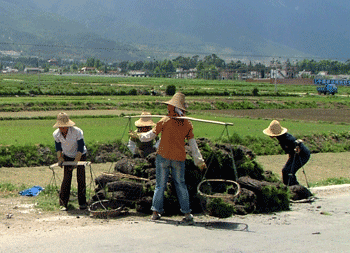Oct 6, 2003
TAKING advantage of the National Day vacation, Running Dog took a plane to Xi'an, China's former capital and the home of the Terracotta Army, which guards the tomb of the legendary old tyrant, Qin Shihuang.
Running Dog already considers travelling to be something of an ordeal, and finds it increasingly difficult to get excited by the Tang dynasty tableware, or by the First Emperor's lovingly restored cesspit, or by the meretricious glaze of any number of commemorative revolutionary sculptures that are usually on offer. Once it is over, one is glad one went but pleased that one no longer has to feign interest in the rusted arrowheads and five-metre friezes of 2,000-year old battles, and can instead get on with watching the telly.
The constant rain did not help. The streets and lanes and monuments were filled with seething, sulking holiday crowds bobbing under a million umbrellas, forcing and pushing and prodding, spilling out onto the roads and scraping the windscreens of the taxis and trucks and buses, most of which seemed to have been there, in precisely the same spot, for hours (as is the case in many other ancient cities, traffic here is a serious problem: after all, it isn't as if you can just knock down that creaking old pagoda and lay another bus lane).
The crowds were astonishing. Even if Running Dog wanted to catch even the merest glance of a statue of some Lord on his imperial chamber pot, or read the sign underneath explaining precisely what the Lord was doing, it was at the risk of being blinded, emasculated or otherwise maimed by a thousand swirling umbrella blades.
And so, the National Day hordes were shuttled from one "Officially Designated Tourist Site" to another and forced to battle it out for the opportunity to get photographed looking gormless next to a giant bell or a large stone horse, or standing on the very rock behind which Chiang Kaishek once cowered, in his pyjamas.
In a famous event that came to be known as the Xi'an Incident, Chiang fled to the mountain after two generals arrived at his villa and killed his retinue in an attempt to persuade the leader to turn the Chinese army on the Japanese invaders and away from the Communist insurgents. At the "Remonstration Pavillion", which marks the scene, a man added greatly to the sense of occasion by pretending to be Chiang, pacing around the place with a pained expression on his face as a swarm of tourists, including Running Dog , demanded to be photographed with him.



